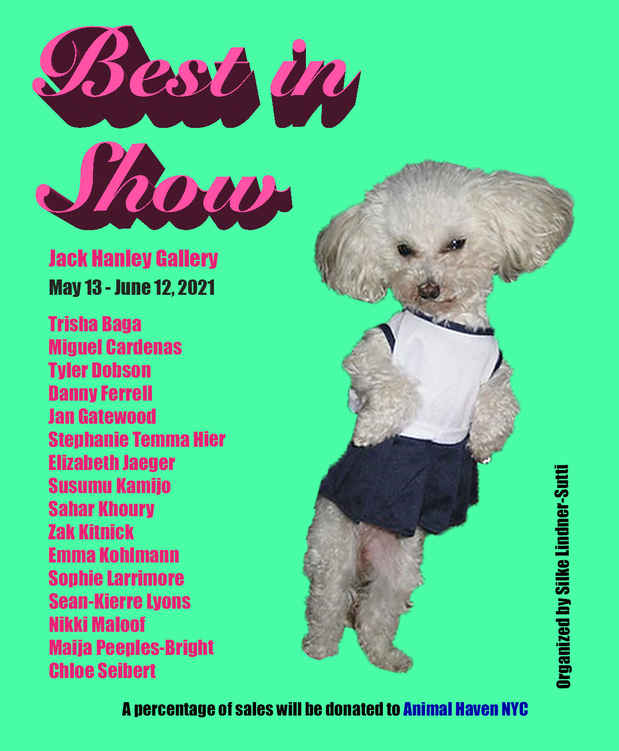“Best in Show” Exhibition
Jack Hanley

This event has ended.
Organized by Silke Lindner-Sutti
Jack Hanley Gallery presents ‘Best in Show’, a group exhibition exploring the fascination with dogs in contemporary art. Since the beginnings of art history, the dog has been a common subject, from prehistoric cave paintings to mythological depictions, allegorical paintings of fidelity in the middle ages to hunting scenes or renaissance portraits promoting social status. The dog is a beast, a loyal companion, a protector, status symbol and with its intuition and hyper-sensitivity, alludes to unforeseen events. While often having played the supporting role, the dog has become an increasingly central subject since the standardization of dog breeds in the 19th century. Still today, perhaps more than ever, the dog has found a prominent place in contemporary art and culture, providing platforms to experiment with shape and colors, becoming humanoid hybrid, cute accessory, subject to serial image making and processing, innocent mascot or symbol of an egalitarian utopia.
Danny Ferrell’s Self-portrait with River places himself in the tradition of European royalty painting. Proudly, he gazes into the distance while holding King Charles Spaniel ‘River’. Immersed in pink light, his work celebrates contemporary lifestyle, the love between men and dogs and elevates the portrayal of queerness into a grander history.
For Susumu Kamijo and Sophie Larrimore the poodle is a central part to both their practice. On the verge of abstraction and figuration, their figures and hair styles provide a perfect playground for balancing colors and shapes. Kamijo’s most recent works fully dissolve the body, amplifying the painting’s dynamism and abstract quality while
Larrimore embeds her poodles in dense and maze-like compositions. Self taught artist Jan Gatewood uses the dog among other animals as a neutral tool that helps him expand upon material contradictions, often using humor and immediacy as a point of departure.
Miguel Cardenas’ painting Heart of a Dog morphs a dog’s head onto a human’s torso while Chloe Seibert’s bestial sculpture of a humanoid dog with piercings in its face is suggestively kneeling on the floor. Both works depict the closeness of dog and human while showing the absurdity of their physical disparities, like mythical creatures both
ancient and futuristic. Trisha Baga’s pyramid poodle Joanna calmly carries a fire on top of her pyramid shaped body. Like a canine Sphinx, she sits still like a guarding talisman, waiting to be praised.
Sean-Kierre Lyons’ painting A smart dog is a bad dog and a bad dog is a smart dog is part of Lyons’ very own fantastical world of whimsical creatures that live in their own realms among flower warriors, rocks and blooms in a ‘Black Flower Forest’. Similarly, Emma Kohlmann’s dog-human hybrids coexist among other wondrous characters of flora and fauna and create an egalitarian cosmos, free from hierarchical orders. The absence of hierarchies is also palpable in the flatness of the utopian landscapes of Maija Peeples-Bright’s Animal Kingdom in which dogs and all other animals are lovingly referred to as ‘beasties’.
Reminiscent of Marcel Broodthaers’ ‘The Farm Animals’, Zak Kitnick transposes and enlarges images from a set of dog postcards onto powder coated steel shelves. The variety of the canine breed offers Kitnick a platform to combine his interests in systems of taxonomy and structures of image production and exhibition. The seriality of images is also subject to Tyler Dobson’s versions of Robert Indiana’s iconic Hope image. Alluding to the wave of increasing dog adoptions during last year’s lockdown, the paintings play on the mutual dependence between dogs and humans. Stephanie Temma Hier fuses oil paintings and ceramic sculpture in unique pairings that fix the stream of fleeting digital images into slow, meticulously executed compositions. The mainly unrelated images of painting and ceramic sculpture, like running greyhounds and cups of blueberries, play with our collective repertoire of images in a comical and poetic way.
Confused and with big eyes, Elizabeth Jaeger’s Lost Dog looks up at the viewer, seemingly in need of help. Like many of Jaeger’s animal sculptures, comical and vulnerable, the dog is portrayed in its signature characteristics, gently guiding the viewer to empathize. Sahar Khoury’s sculpture evokes an equal sentiment. Made of paper towel, Khoury’s sculpture is an homage to her own dog Esther, her portrayal a recurring subject in Khoury’s work that has been manifested in many shapes and materials. Used as a proxy for human emotions and behaviours, domesticated animals often inhabit the canvases of Nikki Maloof. In Dog Park and Farmers Market, Maloof exemplifies the difference between dogs’ and humans’ etiquette to the point, letting the dog, wild and uninhibited, steal the show in the back of the well-groomed display of eggplants, cucumbers and freshly cut melons.
A percentage of sales from the show will be donated to Animal Haven NYC
Media
Schedule
from May 13, 2021 to June 12, 2021
Opening Reception on 2021-05-13 from 12:00 to 19:00